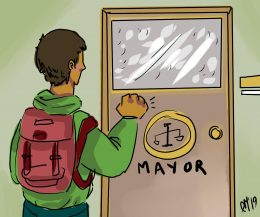
How can students interact with the city of Binghamton in a meaningful way?
That was a topic of conversation when the Pipe Dream Editorial Board sat down with Binghamton Mayor Richard David earlier this week. During the talk, David emphasized the ways in which students can interact productively and effectively with city government.
He encouraged student residents to contact government offices if they have a problem, if something in their neighborhood is in need of repair or if they have an idea for how to improve an aspect of the city. David expressed interest in hearing student concerns and suggestions and listened carefully to ours. The mayor also pointed our attention to the city of Binghamton’s mobile application, which allows users to submit service requests and contact city hall directly.
While a mobile app and willingness to listen do not necessarily equate with accessibility, these resources have the potential to facilitate a closer relationship between students and their community.
For many students, there’s a clear divide between city and campus life. BU’s campus is physically isolated from the city of Binghamton. Most students who live on campus find little reason to venture into the city proper — apart from a weekly trip to State Street, or perhaps to grab a bite in one of the restaurants Downtown. Students living off campus are, if only because of geography, more connected to their city and patronize its stores and restaurants on a more regular basis. However, even these students tend to operate within the same circuits, not venturing too far out off the beaten path. For the most part, students are largely disengaged from local politics and demonstrate apathy toward municipal proceedings.
This apathy stems from a place that is at the very least understandable. After all, for many, the city of Binghamton is only a temporary home. A large portion of the student body views the area as a four-year stop on path to careers, and the city becomes a bystander in the college experience. Most University students exist in a bubble separate from city life, where they spend the majority of their time living a campus-centric lifestyle.
But even with this outlook, there are advantages to engaging with the surrounding city. Whether it is taking a semester-long internship at a local company or just alerting the city of a pothole that needs filling, students can actively make the best of their college experience, and help the city along the way.
Yes, students are entitled to live at whatever level of community engagement they choose, but we believe that apathy should not be the default setting. A more cohesive and involved relationship between the city and BU students can open up mutually beneficial opportunities in the future. Students can gain practical experience from internships, political advocacy and volunteer work within the city of Binghamton. Likewise, the city can tap into a pool of talent, an economic base and find new activists.
As the University continues to expand, the relationship between students and the community is becoming harder to ignore. If we want the nature of that relationship to be productive, we cannot forget that the city government is a living, breathing entity — one that is a resource to all residents of Binghamton, no matter how long their stay.


